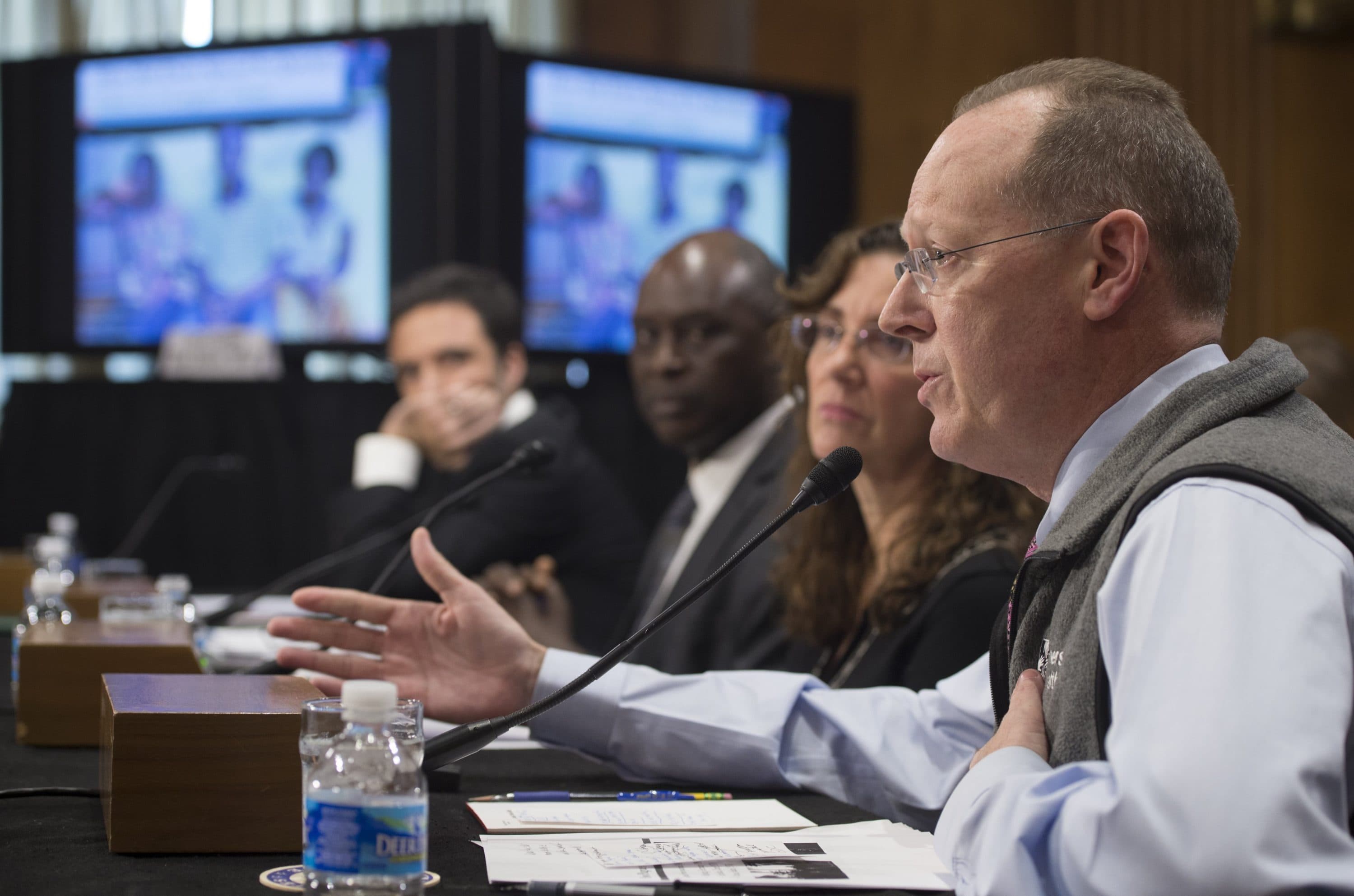
For Paul, 'everyone mattered': Colleagues and friends remember Paul Farmer, in their own words
Dr. Paul Farmer, Harvard professor and Partners In Health co-founder, died in Rwanda last week, at 62. Within hours of the news, tributes from his students, colleagues, friends and world leaders flooded the internet.
Farmer had deep ties to Boston. Indeed, Cognoscenti has published pieces by some of his closest PIH colleagues over the years, including Ophelia Dahl, Joia Mukherjee, Louise Ivers and Jon Lascher.
We knew we wanted to recognize Dr. Farmer, and yet how could we possibly ask just one writer to memorialize a man referred to as a global health icon and a living saint? We opted, instead, to put a call out to people who cared deeply about his life and legacy.
To be clear, the voices we feature below are hardly comprehensive of the people who knew, loved and were influenced by Dr. Farmer. But we hope it’s a representative swath. We hope these little memories tell you something about the man he was, and help you remember the ferocity of his mission to give all people dignity and love, his audacious and unyielding standards, and his vision for a better world.
As we were compiling these reflections, one contributor joked that Paul, if he knew what we were up to, would probably have told us to stop talking about him and go take care of patients. That was a common sentiment among this group of people, for whom the work continues. But perhaps these words, from Farmer’s colleague Daniel Palazuelos, sum it up best: “I will always work to remember his greatest lesson: nothing is sustainable except for how we sustain each other.” — Cognoscenti editors
I first met Paul in 2012. I was a 22-year-old immigrant kid who suddenly found himself at Harvard Medical School struggling with a serious case of impostor syndrome, and with dreams of returning to my home on the island of Hispaniola to work for underserved communities.
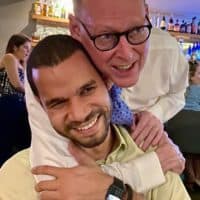
Paul welcomed me onto his team, and a few weeks later I found myself in Haiti, by his side, at the University Hospital in Mirebalais. What neither of us expected was that everyone there thought I was his son. Paul, in his usual fashion, thought it would be funny to tell everyone – including the president of Haiti – that I was, in fact, his son. The joke would ultimately become reality.
Over the following decade, Paul became a father to me. He expertly shaped my career trajectory and moral compass, showing me how to work in pragmatic solidarity with and for the poor, and how to turn ideas of equity into lifesaving care. He did it all with a kindness and love that serve as my guiding light to this day. His legacy will live on forever, because what he did for me, he did for countless millions, creating a family and a mission that will continue to bend the arc towards a better world.
— Wilfredo R. Matias, MD, MPH, infectious diseases fellow, Mass General Brigham; Research fellow in medicine, Harvard Medical School
Advertisement
In early 2002, on my first trip to Haiti, Paul emailed me the night before my flight to insist that I stop in the Miami airport and buy as many wristwatches as I could carry. He knew a shop, Bijoux, where I would find them in the terminal.
Partners In Health had recently started providing antiretroviral therapy (ART) for HIV patients in Haiti. At the time, many scientists and clinicians objected to this treatment — the regimen required a strict schedule and most Haitian patients did not have access to a timepiece. A leader from USAID had publicly declared in 2001, "[they] cannot tell time." But on the day I flew to Haiti — a nervous, 24-year-old assistant laden with wristwatches wondering if I was breaking international smuggling laws — every patient recently enrolled with PIH on an ART regimen received a brand new watch and a lesson from their community health worker about when they should take their medication.
At that same moment, on a much larger scale, the world was anxious about the notion of providing expensive HIV treatment to a population that lacked access to food and clean water. Dr. Paul Farmer treated thousands with antiretroviral therapy and saved millions of lives, disregarding the popular advice from the medical community. But he also treated the much more prevalent disease we all suffer from: the doubt we harbor about ourselves — and the doubt we hold as a world community in our ability to help each other in spite of the cost.
— Melissa Gillooly Allen, chief of staff to Paul Farmer 2002 to 2005, PIH Rwanda project manager 2005 to 2009
I lost my captain, my mentor, my trickster uncle, my great friend. I didn't think there would be much utility in grieving publicly, but I'm looking up from my grief to remember that what Paul wanted was incredible in its simplicity. His message was radical but straightforward: national borders, price points, patents, policy — everything is mutable if we focus first on how we treat one another.
He once told me: humans are fragile, and we have to tend to each other. I don't worry that the world will forget Paul as an icon; I worry that we will forget the core of what he tried to teach us. As we suffer the challenges ahead, I will always work to remember his greatest lesson: nothing is sustainable except for how we sustain each other.
— Daniel Palazuelos, MD, MPH, director of community health systems, PIH, assistant professor Harvard Medical School, assistant director of the Hiatt residency in global health equity at the Brigham and Women’s Hospital
I am so sad to have lost Paul. Each time he came to Liberia — even if I was on break — he asked me to drive. People would ask “why?” I said, “He’s my Papay.” I will miss him a lot. Allah says we all came from Him and we will all return to Him.
I remember we were driving to the Royal Hotel [in Monrovia]. He asked how my family is. I told him my wife is a [Ebola] survivor. He told me, “When I come back, I will invite you and your wife to dinner. I will write a book on her.” She was so excited. When I told her he died, she said “The white man?!” She was crying.
We were once driving to meet then Liberian President Ellen Sirleaf. I forgot to turn off my phone and it started ringing. He said, “Kamara is that your phone? I need that ring tone!”
Once, I drove him to the TB Annex Hospital. As soon as he got there, he asked if any patients could barb [or cut] his hair. He sat there and let them do it.
— Varney Kamara, PIH driver, Monrovia, Liberia
Despite the fact that Paul’s biggest contribution in my life was the path he carved for us to all do the work we do in global health with an eye towards our collective humanity, one of my favorite memories was rounding with him at the Brigham — the hospital where we both practiced medicine.
In many ways, I chose the field of infectious diseases because of Paul. He was my attending physician when I was in training. I recall the word on the street was, if you are rounding on patients with Paul, be prepared to pack your dinner, since you will be there late. The reason was — everyone mattered. We could barely get out of the elevator before Paul was swarmed with people who wanted to chat, and he made time for EVERYONE.
He was fluent in French-Creole, so he could comfortably speak with members of the large Haitian community who work at the Brigham. He would joyfully engage with them about their family, their life, even what books they were reading. Each person mattered — whether it was the hospital CEO or the person who took the food tray away. I loved that about Paul. We all did. Everyone mattered to him and everyone had a story to share. And he remembered them all, remarkably, by name. Paul is truly one of the most remarkable people to have walked this earth and we all miss him dearly.
— Ingrid T. Katz, MD, MHS, associate faculty director, Harvard Global Health Institute
I will always work to remember his greatest lesson: nothing is sustainable except for how we sustain each other.
Dan Palazuelos
When I was a young advocate, working for our grassroots arm PIH Engage, I accompanied Paul, his team, and some of our other leaders to a conference and legislator meetings in Washington, D.C. At the time, I was in the midst of what felt like a big crisis in my career.
Paul took the time to give me a hug before departing to his next meeting. At just that moment, somebody on his team told him that the schedule had changed, and he asked a question about the new plans.
In all, we stood there, hugging, on a Washington, D.C. street for at least 45 seconds. I had no idea what to do, feeling that I couldn't stop hugging Paul Farmer — but also feeling like I had been hugging him too long. When he realized how long it had been, and how concerned I was about the issues I was facing in my career, he simply said to me, "You know it's all going to be okay, right?" Then he got into the car and went to his next meeting.
Since learning of his death, those are the words I keep hearing in my head in Paul's voice, "You know it's all going to be okay, right?"
— Justin Mendoza, MPH, PIH advocacy lead, U.S. health care
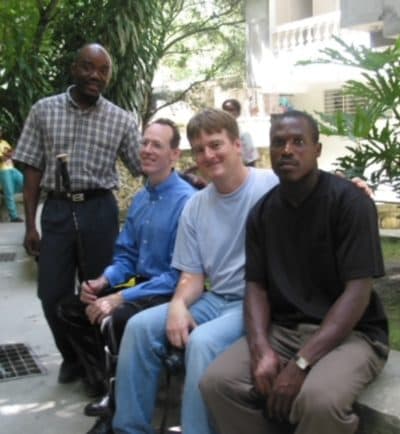
I was with Paul in Cange, in the Central Plateau of Haiti where PIH began. We had been visiting with a trauma team during surgery under very challenging conditions. At the end of the night, Paul and I split a bottle of wine. We probably went to bed around 1 a.m., then we were up by 4 a.m. to make the drive back to Port Au Prince. This was 2003, and the roads were very, very bad, bumpy, unpaved. On the ride back to the capital, I felt like I was about to be sick. I was embarrassed that I was going to slow down our caravan of cars, but I made them pull over. And I got sick on the side of the road.
Paul came to my side and cared for me. He was so loving and gentle. I was just car sick — nothing serious, just a late night, with too much wine and too little sleep — but the level of care he gave me was more than I’d ever experienced from any doctor. I thought to myself, if I ever got really, really sick, Paul is the person I’d want looking after me.
— Paul English, entrepreneur, PIH board member
Paul Farmer was good to me. When I joined Partners In Health, he came to Liberia and he met me at the office. He was very happy to see a female driver in his organization. He and I talked that day and he told me he was going to send me a computer, so I can learn [how to use one]. When he went back to America, he sent me a computer. Today, I have computer knowledge because of him.
Every time he came to Liberia, I was the one that would go for him at the airport. We would chat and take photos every time.
I was driving when I heard the news from one of my colleagues. They said, “Oh, your father passed on." I had to park the car because I was crying. I was expecting him in Liberia next month.
I just want to say sorry to his family. Let the almighty God be with his family. They should take heart; I love them.
— Vivian Tarley, mechanic driver, PIH Liberia
Since Monday, those are the words I keep hearing in my head in Paul's voice, "You know it's all going to be okay, right?"
Justin Mendoza
I remember moments and conversations with Paul so vividly. One of my biggest fears is actually forgetting them, and not being able to create new memories now that he’s gone.
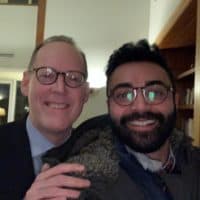
When I had returned from working overseas a few years ago, Paul and I had a conversation about an incident. An effort to mobilize more resources had unintentionally come across in a negative way, and I remember feeling frustrated, thinking more could have been done.
Paul reminded me that a big mistake in global health was to assume you care more than people who are living in the daily complexities of the struggle. For Paul, relationships were at the center of the work. I have reflected on this moment many times, and there is a deep void knowing Paul isn’t here any longer to share his wisdom.
— Abraar Karan, MD MPH DTM&H, infectious disease physician, Stanford University
I cannot speak about Paul without speaking of Loune Viaud and Nancy Dorsinville. I met the three of them in 2002, when Loune received the Robert F. Kennedy Human Rights Award. At the time, I was the human rights attorney at RFK Human Rights who was going to help them to solve a “little” problem they were having with the Inter-American Bank (IDB). The U.S. government was working with the IDB to block water and health loans to Haiti.
I had no idea the long journey we were embarking on, how the three of them would forever change the way I worked. Over the next 10 years, they taught me that it was not only OK to bring my heart and emotions into our work, but showed me that it was the only way to do it. They taught me to lead with love.
One of my first memories of Paul was on a conference call where we were planning to bring a congressional delegation to Haiti. All three members of Congress were women and we were planning to drive them to Cange, in the Central Plateau.
Paul jumped in and said, “make sure they pack sports bras.”
“Ummm … I’m sorry, what?” I asked.
“The road to Cange is very bumpy. Trust me, they’ll be more upset if you don’t tell them ahead of time.”
Upon arriving in Cange safely and well-supported, Paul introduced us all to Isaac whom he referred to as “IDB kid” — a child who was dying of typhoid because he only had dirty water to drink. Paul didn’t hide his emotion. He shared his rage and sadness at the senseless death of a child, because the United States and the IDB were blocking clean water to the most impoverished nation in our hemisphere. By not hiding his emotions, he taught us to bring ours too. For years to come, our work would be fueled by our rage over Isaac’s death.
On a later trip to Cange, Paul took me to a hospital Zanmi Lasante was building. As we were driving there, he had to take a call and climbed onto a massive rock just off the road to get good enough reception. He began wildly motioning to the rock while he was on the phone and lit up. As soon as he got off, Paul told us we needed to get this fairly massive boulder to the hospital for the garden he was preparing for the waiting room.
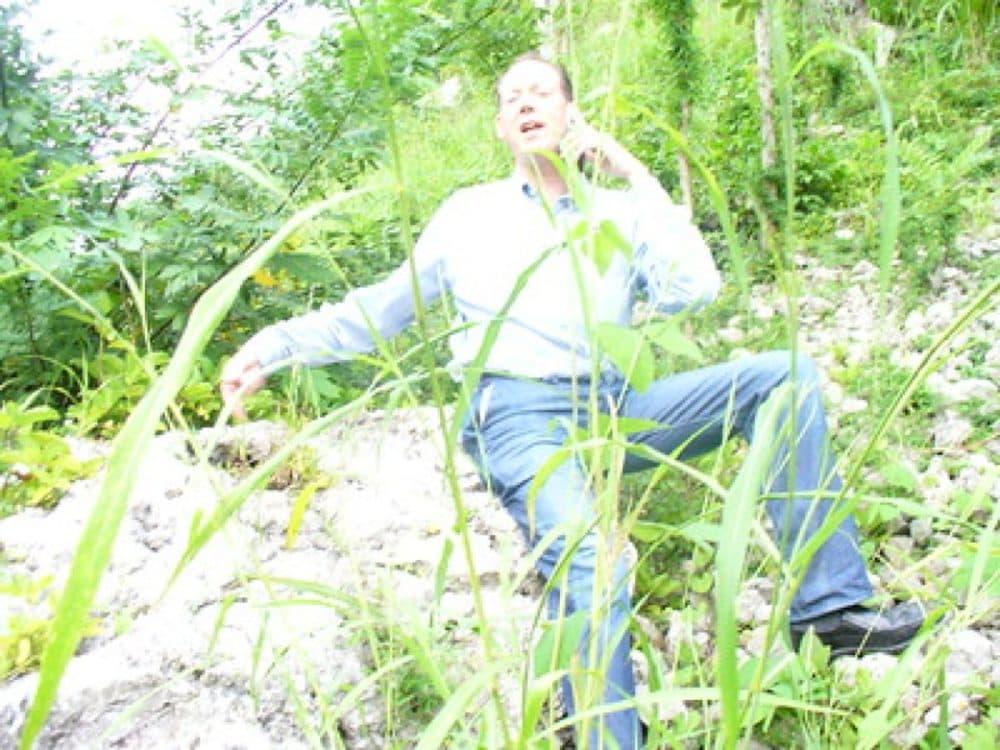
I, and the people who would later be responsible for transporting the rock to the hospital, thought the whole thing was a little crazy, but Paul was so insistent and giddy that no one argued. When I got to the hospital, Paul showed me their state-of-the-art medical facilities and then took me to the waiting area. It was facing the hills and was next to a beautiful garden, the center of which would be the rock. Paul had me sit on one of the benches and look at the view. I can still picture it now — it was breathtaking. Like too many Haitians, patients had to travel a long way for treatment, but Paul was making sure that when they arrived they would be surrounded by beauty.
Paul treated people with love. Dignity is not enough. From that day forward, my standard for realizing human rights became love.
As advocates, we can get lost in the fight, and often the despair. And today, many of us are feeling the grief of losing someone we cared so deeply about while knowing how desperately the world needs Paul’s work. (Those of us who knew Nancy are grieving her loss as well. She passed away in April 2021.)
Paul taught us all the path forward through his life. We must continue the work with our full hearts. And our hearts can be angry. Our fights against injustice and the structural violence of poverty and racism may be fueled by rage, but it is the gentle ways in which Paul showed us how to love that will always guide us.
— Monika Kalra Varma, former director of Robert F. Kennedy Center for Justice and Human Rights
Paul treated people with love. Dignity is not enough. From that day forward, my standard for realizing human rights became love.
Monika Kalra Varma
In September 2014, Ebola was spreading quickly in West Africa and the world was in a panic. PIH was working in East Africa but not in West Africa in the three countries that were struggling with the outbreak.
Paul came to the PIH board meeting to present the situation and basically said, “If not us, who?” He implored us to begin working in West Africa because PIH had extensive experience in infectious disease and could help the countries build the health system which had been weak to start and destroyed by Ebola. There was an intense debate going on in global health about the world’s ability to control the virus as opposed to care for the sick. Paul and Ophelia Dahl had assembled a group of colleagues to present a plan to the board and the timing was critical.
The board voted unanimously on that day in early September to begin work in West Africa, even though PIH had no endowment and no savings beyond our current year’s budget. Paul left the meeting and was on a plane to Liberia within days, calling potential donors along the ride to the airport to get us some initial funding.
I’ve been proud to be a part of the PIH organization and this board meeting stands out for the call to action that Paul inspired in us. Sure, Paul did not do this work alone — but he was the type of leader who ran into the fire to treat patients and he went with a group of well-trained passionate professionals to accompany those on the ground.
Many people have read about the results of this work, how the virus was stopped and how PIH employed and trained hundreds of survivors to become health care providers. Paul was the leader that others followed. We trusted his leadership and he was right there doing the difficult work, demonstrating the two pillars of proximity and accompaniment.
— Lesley King, PIH board member
One of the greatest things about working with Paul Farmer was that I could call the office of basically any member of Congress, request a meeting with Dr. Farmer, and, in most cases, have it scheduled immediately. One of the worst things was navigating the Senate and House buildings that are a labyrinth of tunnels and hidden corridors — and which take years for staffers and members to learn — with Paul inevitably getting annoyed with me that I didn’t have them memorized yet.
That annoyance lasted just seconds. When we'd finally enter the office, it was amazing to members of Congress and their staff listening to his every word about Haiti, global health or any other topic. He always made sure to somehow include my nursing background which he knew would strengthen our positions, given the respected position nurses hold in this country. We will carry on his message.
— Donna J. Barry DNP MSN MPH, assistant professor and director of Regis In Haiti, Regis College, Partners In Health 2001-2013, (and from 2007-2013, advocacy and policy director)
When you were in the presence of Paul Farmer, it wasn’t uncommon to feel like an imposter. “Why would this wonderful and accomplished human being pay attention to little old me?” But then Paul would make you feel like the most important person in the world. He had the ability to make you feel so worthy and loved.
Paul was a champion of nurses, and I always made sure to remind him of just how critical these health care workers are. My reminders were so persistent that when Sheila Davis was named CEO of Partners In Health, Paul called me right away to let me know a nurse would be running the organization.
— Antoinette Hays, PhD, RN, president, Regis College, board member, PIH
My favorite memory of Paul was the second time I met him, at his house in Cange, Haiti, in 2007. Just weeks before, we’d been in a conference room in Boston with a team trying to design a research project to demonstrate the human rights impact of the U.S. and the Inter-American Bank blocking social sector loans to Haiti. I was the primary investigator on the project, but I was a nobody compared to his vast network. But when he saw me again, he greeted me as if I was an old friend, and asked me to join the small group gathered around warm beer.
People all over the internet are posting photos of themselves with Paul’s arm around them. I know why. Paul didn’t just believe in the inherent dignity and worth of every human being, he made you feel it about yourself when you met him. His belief was infectious. Paul lit an ember in thousands, millions of people around the world, conscripting them all to work for a better world. Together, we are the flame that does not waiver.
— Amanda Klasing, program lead, monitoring, evaluation and learning, Human Rights Watch